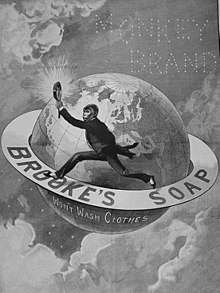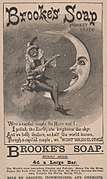Monkey Brand
Monkey Brand soap was introduced in the 1880s in cake/bar form in the United States and United Kingdom as a household scouring and polishing soap.

History
Initially, Benjamin Brooke & Co Ltd, a firm owned by Sidney and Henry Gross, had produced the soap in Philadelphia.[1] The soap's highly abrasive[2] agent was probably pumice.[3]
Lever Brothers bought the company in January 1899[4] and transferred the production of Monkey Brand soap to Port Sunlight near Liverpool. The name ‘Benjamin Brooke’ (hence Brooke's Monkey Brand) was retained to promote the Monkey Brand soap on both sides of the Atlantic.
In George Bernard Shaw's Pygmalion and the musical based on it (My Fair Lady), Henry Higgins tells his housekeeper to take Eliza Doolittle upstairs and clean her up, and to use "...Monkey Brand, if it wont come off any other way" (Act II).[5] In the movie version, the line is changed to "...sandpaper, if it won't come off any other way." In Beatrix Potter's 1912 novel The Tale of Mr Tod, Mr Tod mentioned Monkey Soap as one of the soaps needed of cleaning his bedding.
The advertising campaign for Monkey Brand soap was used by cultural historians for analyzing Victorian values and social attitudes at the intersection of race, gender and class.[6]
- Gallery

.jpg)
.jpg)
_Wellcome_L0030375.jpg)
_(14582835630).jpg)

See also
References
- Cohen, R.; Cook, P. L. (2013). Effects of Mergers. Taylor & Francis. p. 218. ISBN 978-1-136-51121-9. Retrieved February 28, 2017.
- "American Dental Journal, [1908], Vol. 7, No. 6". quod.lib.umich.edu. Retrieved 2016-11-06.
- "Monkey Brand Comes Clean". Zoonomian. 2012-02-01. Retrieved 2016-11-06.
- Wright, Colin. "Advert For Brooke's Monkey Brand Soap". www.bl.uk. Retrieved 2016-11-06.
- Bernard Shaw. Pygmalion (1916). ACT II. Bartleby Great Books Online
- McClintock, Anne and George Robertson. Soft-soaping empire: Commodity racism and imperial advertising. In Travellers' Tales: Narratives of Home and Displacement (1994) edited by Jon Bird, Barry Curtis, Melinda Mash, Tim Putnam, George Robertson, and Lisa Tickner. London: Routledge.
Further reading
- Bird, J.; Curtis, B.; Mash, M.; Putnam, T.; Robertson, G.; Tickner, L. (2005). Travellers' Tales: Narratives of Home and Displacement. FUTURES: New Perspectives for Cultural Analysis. Taylor & Francis. p. 136. ISBN 978-1-134-91297-1. Retrieved February 28, 2017.
- Mirzoeff, N. (2002). The Visual Culture Reader:. Art history and theory. Routledge. p. 512. ISBN 978-0-415-25222-5. Retrieved February 28, 2017.
- Wilkins, M. (1989). The History of Foreign Investment in the United States to 1914. Harvard studies in business history. Harvard University Press. p. 341. ISBN 978-0-674-39666-1. Retrieved February 28, 2017.
External links
- * Advert For Brooke's Monkey Brand Soap, The British Library
- History of Benjamin Brooke & Company
- Phil Beard, Monkey Wash, Donkey Rinse, May 22, 2008